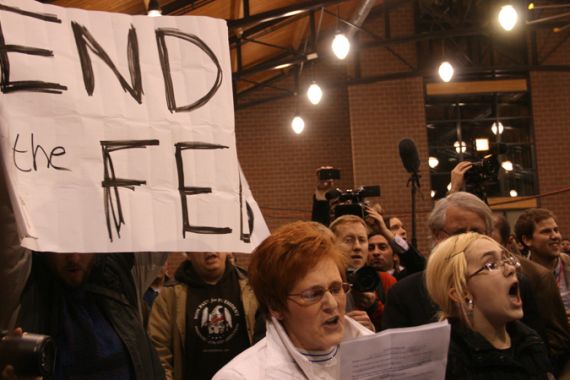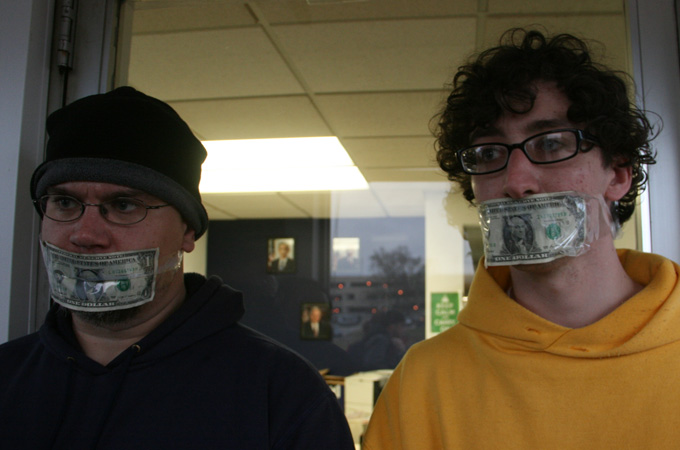Occupiers aim to impact Iowa caucuses
Occupy Iowa Caucus activists stage a week of protests to influence locals to take a greater part in their own democracy.

 |
| Protesters joined together to help the average American join in the democratic progress [Teresa Krug/Al Jazeera] |
Des Moines, Iowa – As caucus-goers head to Iowa precincts on Tuesday, Occupy Iowa Caucus protesters are hopeful that their direct actions and media attention this past week have paid off.
After 59 arrests and several sit-ins, the protesters have tried to make it clear that what they are working toward is helping the 99 per cent – the average American – to better participate in their own democracy.
“We are here to make the caucuses a true representation of democracy,” said Paul Engler, an activist and protester from Occupy LA who was part of the People’s Caucus, which launched this past week’s actions.
Advocating for Iowans to become more vocal at their local caucuses – and possibly even vote “uncommitted”, or for none of the candidates on the ballot – has been the leaderless group’s main initiative. Despite its members’ numerous and disparate grievances, they have joined together to achieve the same goal: making government more accountable to the people.
Setting up a plan
The People’s Caucus on December 27 took place just steps away from the state capitol and attracted not only dozens of national and international journalists, but also about 250 people from around the country. Some attendees were passionate enthusiasts, campaigning in their respective corners of the United States, while others were curious onlookers who were unsure whether or not they should pledge their name along with others.
Even before the organisers unveiled the main event of the night – a mock caucus in which participants voiced their grievances instead of their support – the energy and camaraderie in the room was clear. Though many of them had never met one another, all were hopeful that this event was going to finally bring them an outlet to voice concerns.
For 45 minutes, participants were allowed to share their platforms with the public, in typical caucus form. Their ages spanned multiple decades, from teenagers to those in their 70s. Each speaker was respectful, honest and warmly embraced by the audience.
At the end, the organisers encouraged everyone to split into affinity groups, based upon candidates they least liked, with the initial idea that these groups would be mobilised to “occupy” candidates’ headquarters the following day.
The numbers varied, but Mitt Romney collected the most and Rick Santorum – who was then still considered a long shot – only attracted one. Others, like Rick Perry, collected a few because of their views on abortion and gay marriage.
There was even an affinity group against President Barack Obama, and a strong showing for “uncommitted”. Clarke Davidson, who runs live streaming for the Iowa Occupy actions and was fired from a local television station for his participation in the movement, tried to persuade members of other affinity groups to work toward solutions rather than simply angrily targeting candidates.
“Let’s not throw stones at hatred,” Davidson urged attendees. “We’re going for healing.”
The week of direct actions
The next morning, however, the size of the group had dramatically decreased and remained roughly this size for the remainder of the week as roughly 40 to 50 people showed up, prompting a debate over whether everyone should split up to pursue individual candidates – meaning smaller turnouts – or combine forces and take one candidate at a time.
After about an hour and a half of open debate, the decision was made to not only resort to direct action against Mitt Romney – who the activists considered an obvious member of the 1 per cent – but also against Wells Fargo, which had contributed $61,500 to Romney’s campaign and was conveniently located a block away from the Republican’s Iowa headquarters.
At the first action against Mitt Romney, protesters chanted, hoisted signs and eventually blocked entrances to deny anyone from leaving as employees sat inside, unable to exit while the parking lot continued to fill with people.
In the end, seven people were arrested, but only after the police officers had explained the violations to protesters and informed them that they would be arrested if they did not immediately move away from the doors. All arrests were handled peacefully, and a paralegal was on site to ensure that protocol was followed and no one was hurt.
“We’ve got a working relationship,” said David Goodner, a community organiser with Citizens for Community Improvement, referring to the Des Moines police force. “We’ve got a job to do, and they’ve got a job to do. We aren’t out here for them. We are out after the corporations.”
The group then migrated to a Wells Fargo branch, where protesters chanted “raises for the police” and “this is what democracy looks like”. Three more people were arrested in a civil manner, including an 8-month pregnant woman.
The next day, more direct actions – this time outside Ron Paul’s headquarters and the Iowa Democratic Headquarters – took place. Again, there were civil interactions between police officers and protesters, unlike in other parts of the country where batons and tear gas were used.
Protesters and activists’ attendance hovered around 70, but several motorists honked their support as they drove by.
More actions at various locations continued throughout the rest of the week leading up to the caucuses. While arrests and the media increased as the week went on, the turnout at the actions varied little throughout the week and many of the same people were arrested multiple times.
The campaigns respond
When protesters/activists first arrived at the Iowa Democratic Party Headquarters, demanding that the president be called to address numerous concerns – including the National Defence Authorisation Act – Chairwoman Sue Dvorsky and executive director Norm Sterzenbach came out to speak with them. Dvorsky insisted that it was not possible to get Obama on the phone.
“We are here to listen to you. We are not trying to ignore you,” Dvorsky said to the protesters, many of whom had actively campaigned for Obama in 2008. “But we don’t know what you want,” she added, expressing frustration that her offer to meet with protesters who had been arrested 10 days before at the headquarters had gone unheeded.
Michele Bachmann’s Iowa campaign had a different response to the prospect of protests. When asked earlier in the week about potentially planned actions at various candidates’ campaign headquarters, Bachmann’s Iowa campaign manager Eric Woolson said it would be “terribly disrespectful”.
“They have the right to express their opinions, but they shouldn’t step on my right to express my opinion,” Woolson said, continuing with, “No 1 per cent here.”
But one candidate took a different approach and even seemed to support the activists’ right to protest.
When several members of Occupy Iowa Caucus began chanting at a recent Ron Paul Veterans Rally as the candidate took the stage, the Republican responded along the lines of “Isn’t it great that we live in a country where we can express our opinions?”
But he did not invite the activists on stage with him, nor did he make plans to visit with them afterward. He also did not summon security. It was his supporters – many of whom tried to reason with the protesters – that responded negatively.
“He’s for everyone. He’s not for Wall Street; the lobbyists don’t even visit him because they know you can’t buy the man,” said John Kurr, a Des Moines resident who has been a supporter of Paul’s since 2007.
The local reaction
For the most part, many Iowans – especially Occupy Iowa Caucus’ neighbours – seem to have taken a “live and let live” approach to the week’s events, with the occasional critique.
Jennifer Mitchard, a graphic artist at the popular Raygun Clothing Store, who is still uncommitted, said she was once somewhat involved, but cited difficulties with being able to attend Occupy meetings and actions because she had a 9 to 5 job. She also said she felt very few solutions were being offered, and she disagreed that arrests were a step in the right direction or that occupying space near the capitol was very effective.
“The camping part takes away from the movement, because you’re sort of homeless. It’s difficult to listen to homeless people,” she explained.
Ultimately, though, Mitchard – who said she is still uncommitted but will most likely vote for whoever is lowest in the polls – said she agrees with several of the issues raised by the Occupy movement, including removing money from the big banks.
“I think it’s great what they’re doing and I’m glad that it’s growing,” she said.
Another form of success?
While many will be looking to the actual day to see whether Occupy Iowa Caucus has had a significant impact on the caucuses themselves, some activists felt the movement’s success could be seen in a different way.
For Ross Grooter, a Des Moines resident who both campaigned for Obama and then was arrested at the Democratic Party headquarters earlier in the week, the actions’ main achievement was opening up new channels of conversation. When colleagues and friends have discovered that he is involved with the movement, they have come up to him to purposely discuss politics-something, which was much more rare before, he explained to Al Jazeera.
“It’s already been a success because it’s drawn attention to the issues.”